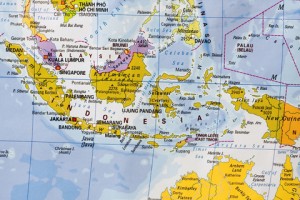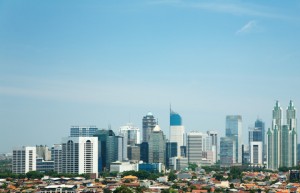
[Updated Oct 2020] A guide to serviced offices and office space for rent in Jakarta as well as general information that may be useful if you are considering renting office space in the Special Capital Region of Jakarta.
For further offices information or to search office space for rent in Jakarta just click. Or contact us for any other office space query.
Indonesian capital
Jakarta is the capital city of Indonesia and with close to ten million inhabitants it is one of the most densely populated areas of the world. Indonesia as a whole is very heavily populated indeed and the majority of people live on the island of Java, where Jakarta is to be found along the north-west coastline. The city was first established in around the fourth century AD and has long been a centre of trade and commerce across South East Asia.
Java has been subject to numerous efforts at colonisation during its history and the city’s harbour was an important location for various sea-faring empires emanating from Malaysia during ancient times. The history of the island has been interwoven to a large extent with the religious ideas of its people and with the range of crops and spices that it has been famous for growing over the centuries. West Java was an area of crucial focus for a number of prominent Hindu empires in the region, primarily the Kingdom of Sunda, which lasted for all of 900 years between the seventh and 16th centuries.
The Sunda Kingdom, its Hindu religion and its control over West Java were doubly threatened during the 1500s by the arrival of European fleets and the growing strength of the Islamic Sultanate of Demak. During the years of Sunda rule, the harbour area was named Sunda Kelapa but when soldiers from the Demak came across from the east and successfully ousted Portuguese forces, they renamed it Jayakarta.
Dutch influence and independence
The island of Java and the areas around Jakarta were among the most highly prized parts of the world during the early years of European exploration of South East Asia. The influence of both Dutch and British traders was felt strongly between the 16th and 19th centuries. Deals were often done and numerous battles fought between would-be colonial forces and native inhabitants and rulers. The Dutch began to dominate the affairs of the island in earnest from around 1619 when they won a decisive victory against the British. The riches and the trading opportunities stemming particularly from the spice trade during this period prompted a large-scale influx of people from China, as well as from different parts of Europe.
Dutch colonisers ruled the city they called Batavia for several centuries and constructed buildings and settlements in their own styles, the last of them dating the early 20th century. By the time of the Second World War, there was little steam left in European colonialism and conquering Japanese forces renamed the site Jakarta. The city was named as the capital of a newly independent Indonesian nation in 1950 and the government initiated a variety of development programmes designed to help increase Jakarta’s profile and international standing. The politics of the city and of the country became highly fractious and often violent as Jakarta became an important centre of South-East Asian commercial activity.

Economy
Jakarta’s economy and that of Indonesia as a whole suffered badly as a result of the region-wide economic crisis of the late 1990s. The fallout from these problems instigated calls for greater democracy and led to the resignation of President Suharto, who had ruled Indonesia for 32 years. The capital has long been the driving force behind economic development in a country that stretches from Aceh in the north-west and the island of New Guinea to the east.
As it moved away from its past as a colonial stronghold, Jakarta’s economy has become more integrated into the global system and it is now one of the key regional centres for the financial services industry. It retains a strong manufacturing sector and trades with much of the world, while also having a worthwhile presence in fast-growing areas like biomedical sciences and electronics. With a population in excess of 200 million, Indonesia as a whole has a thriving economy and one that is important to both the regional and the global financial system.
Office space for rent in Jakarta
There are a huge number of buildings with available office space to rent in Jakarta, primarily in the city’s central business district where dozens of local and international operators have an established presence. With the Indonesian economy currently growing at a rate of roughly six per cent per annum, there are plenty of incentives for multi-national companies to be on the lookout for offices to rent in Jakarta.
The cost of renting offices in the Indonesian capital is rising as landlords tap into the demand for space among their potential customers. A recent report from Cushman & Wakefield suggested that the price per square foot of Jakarta’s office space will continue to increase during 2013 as more and more businesses aim to increase their capacity or start doing business in the city.

Culture and tourism
The cultural heritage of Jakarta is as rich and as varied as Indonesia itself, with millions of people having migrated from outlying parts of the country, as well as from China, to the capital over the course of several centuries. Add to that the influence of occupying forces, traders and religious missionaries and you understand why Jakarta is such a unique and indescribably kaleidoscopic place.
For the past five centuries or so, Islam has been the primary religion of Java and of the majority of people across the country. Perhaps a little surprisingly given Islam’s long association with the Middle East and North Africa, Indonesia has a greater number of Muslim inhabitants than any other country in the world.
Tourism has not historically been an important part of what Jakarta has to offer the world but there are plenty of hugely impressive buildings and historical structures, as well as some world-class museums, hotels and restaurants. Efforts are now being made to ensure that the city is better able to accommodate and attract tourists and business travellers.
Sport and transport
Jakarta is not renowned for its sporting achievements or for its stadia but there is a great deal of enthusiasm for various athletic pursuits and team sports across the city. Soccer matches involving the Indonesian national team draw tens of thousands of people to the 88,000-seater Gelora Gung Karno Stadium. In terms of international competition, there have only really been two major events staged in Jakarta, namely the Olympic-style Asia Games of 1962 and the footballing Asia Cup in 2007.
As you would imagine in a city of ten million and a surrounding population of a further 17 million, maintaining an operational transport system is a tremendous challenge for the authorities in Jakarta. Congestion on the roads is a massive problem and commuters are obliged by law to have a least three people in their vehicles during the busiest times of the day and on the most heavily-used roads. As a result, many millions of people walk to and from their place of work each day and ‘car-free’ days are a common feature of life in central Jakarta.
There are of course a variety of transport options beyond walking, with buses, trains and bicycles all commonly in use across the city. The primary airport linking Jakarta with the rest of South-East Asia and the world is the Soekarno–Hatta International Airport, which is named after the country’s first president after independence and is located 20 kilometres or so to the west of the city centre.
We carry out a free office search and our advisory and acquisition services are also free, always. Our Jakarta office space brokers and agents are globally regulated by the Royal Institution of Chartered Surveyors (RICS) ensuring the highest standards of commercial property advice and service at all times.

The Office Providers are Regulated by the Royal Institution of Chartered Surveyors (RICS)